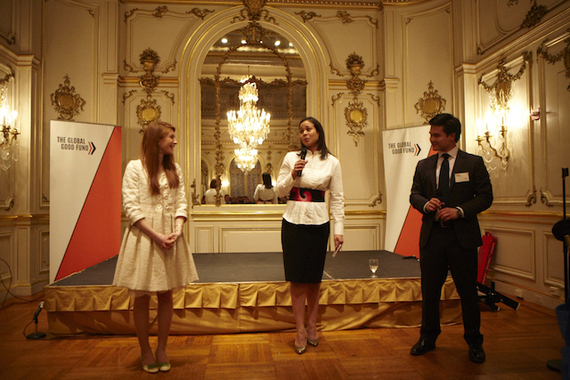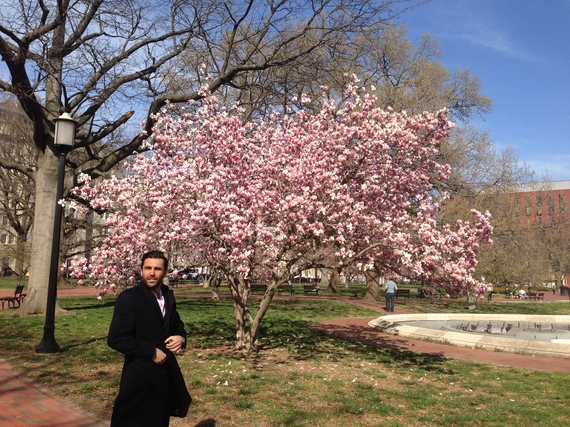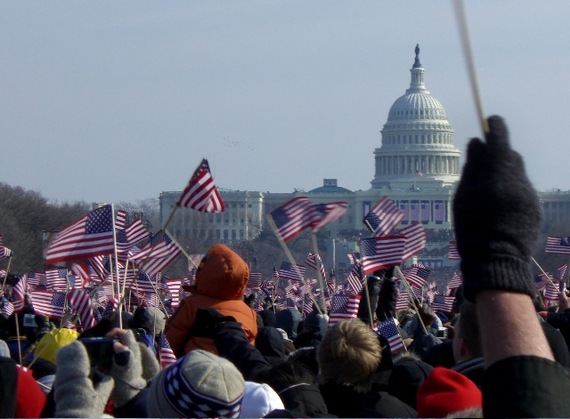Does the U.S. have a stronger sense of independence than other countries? Could this sense of independence translate into acts of kindness and purpose?
During a recent encounter, I met someone who tried to convince me of just that...
Global Good Fund Fellows from around the world unite in person annually for The Global Good Fund Summit. The Summit is comprised of Global Good Fund Fellows, coaches, mentors, advisors, content experts, investors, employees and volunteers.
During our most recent April 2014 Summit held in Washington, D.C., I had the privilege of meeting an esteemed guest, José V Fernández. As each individual Fellow pitched his or her social enterprise before an eager audience, I became intrigued with José's unique perspective on how we handle social causes as a nation.
José (originally from Spain) is fascinated by the paradox that a country founded on individual liberties, rights, and freedoms largely functions as a unified nation. This patriotism is an altogether different fabric from countries around the world and something I too often take for granted until someone like José puts it front and center. Granted, the U.S. has its moments of breakdown. But I too, am struck by the strong sense of patriotism that pervades the U.S., whereby we belong to and volunteer for causes greater than ourselves.
I connect with this idea, especially because it ties directly to the mission of The Global Good Fund. After an enriching discussion with José, I was eager to interview him and dive deeper.
Here is our interview. I hope you enjoy what he shares.
Please tell us about yourself:
As a Consular Officer at the Consulate General of Spain in New York, I work as an adviser to the Consul General. Before this role, I was a Trade Officer for my Embassy helping Spanish companies in their internationalization process to the US (mostly fashion designers). I hold an MBA and business degree and started my career working with several global companies -- L'Oréal, ING Group, and the late Banesto Bank (now Santander Bank).
Both my education and my professional career have been international, which has given me the opportunity to experience a variety of different cultures. I was born in Madrid, Spain but have resided in France, the UK, Italy, and the U.S.
I'm particularly passionate about human rights, poverty, and sustainable development. I am and have been a volunteer for Amnesty International, the UN, and local organizations and most recently, The Global Good Fund.
I'm passionate about other topics too: Politics (I was a candidate to the European Parliament and local elections in Spain), entrepreneurship (I began a few not so successful business endeavors while in college), and extreme sports.
During our conversation at The Global Good Fund Annual Summit, you mentioned that you are fascinated that America -- a country founded on individual liberties, rights, and freedoms - has formed a unified nation defined by patriotism and contributing to causes greater than ourselves. When and how did your fascination with this American paradox begin?
It began a month after I first arrived to the U.S. in August 2001. I was 16-years-old and went to Oklahoma to study abroad for a year. My friends back home in Spain looked down on the patriotism that every Hollywood movie boasted. Sadly, Spain is not a particularly patriotic country and the devotion to national service portrayed through U.S. narrative was (and is) believed to be a sign of herd behavior.
Shortly after arriving to the U.S., I received a crash course on American patriotism. September 11th marked my year abroad. It allowed me to dive into American culture head-on through my host family, friends, and classmates.
At first I hid my cynicism out of respect to their pain, which I shared. It wasn't long before I understood that their loyalty and service to their country was not hollow; it was not a desire to belong, rather a reasoned dedication to a cause greater than themselves.
I grew intrigued by this social phenomenon that was so strange to me. Moreover, I was perplexed by the paradox it created when compared with the other notable characteristics I found within American culture: its fixation with individual rights and freedoms. These apparently inconsistent qualities, I noticed, are actually complementary... and have proven unwavering throughout the years.
Do you think volunteerism is different in the U.S. than in other countries? If so, why do you think this is?
More than volunteering, I think the social convention behind the idea of success differs from culture to culture. I believe that since the Industrial Revolution, most cultures accepted success to be an end result: an expensive car, a big house, a job of responsibility, etc. What you did to get to the position you're at does not matter.
The U.S. leads this school of thought and has managed to lead it's evolution towards a new school of thought, one that defines success as a means - where what matters to society is how you lived your life and not necessarily where you finished. This, I believe, has made volunteering particularly popular in the U.S.
Spain and other countries still have a long ways to go before they catch up. In Spain, the idea of volunteering is still dominated by the church as a form of charity.
You are a volunteer for Amnesty International, the UN, and local organizations, including The Global Good Fund. What have been some of your most rewarding volunteer opportunities and why?
The first time I volunteered at a homeless shelter was while living in Lille, France. I followed an Italian girl I was trying to impress to a place for rejects from traditional homeless shelters, which customarily prohibit vagabonds from consuming drugs. I thought at the time that was a sensible requirement, but these people could not stop and, well, winters in Nord-pas-de-Calais are brutal. We would cook and give them company. I befriended one of the vagrants, so even after the girl went back to Italy, I kept volunteering.
One day my friend didn't come back. After that occurrence, I used my time to think of ways the modest organization could help more people. I made a few calls and got a nearby supermarket to donate food weekly. It cut costs dramatically for the organization. However, the organization had to close shortly after because donations lessened. I've been concerned with the economic models of sustainability for charitable organizations ever since.
You are particularly passionate about human rights, poverty, and sustainable development. What are key challenges we currently face that hold us back from creating exponential impact in these areas?
Many global problems remain unchallenged because we are trying to tackle them locally. I believe countries need to relinquish part of their sovereignty in favor of international institutions that may legislate, enforce, and finance accordingly. Also, many duplicate charitable organizations should join forces.
One of your many passions is entrepreneurship. You mentioned previously that you have had a few "not so successful" startups while in college. Part of being an entrepreneur is taking risks and accepting failure as a way of learning. Why did your college business endeavors fail and what did you learn from these experiences?
My business ventures were short-lived because they were shortsighted. I wanted to make the most money in the least possible time with the least possible investment. One must work in a service they believe clients need. If your clients are not in your head, you'll never be in theirs.
You have also been involved with politics - you were a candidate to the European Parliament and local elections in Spain. What are some similarities you have seen in both the political and entrepreneurial sectors since you have had experience with both? What are some lessons each sector could learn from one another?
Unlike the business world, the barriers of entry into politics currently require huge amounts of money to overcome. A great idea is not enough. Mass media is still king in the political arena and getting to it requires a large economic investment when there is no lobbying power.
However, very much like in the business world, technology is a game changer. Social media is allowing good ideas to go viral and reach more and more people unimpeded by larger organizations. Hopefully, enough technology will be in everyone's reach soon so that we may truly democratize democracy.
If you could have 15 minute Skype call with anyone (dead or alive), who would it be and why?
Nelson Mandela. Impatience is my greatest weakness. Every time patience fails me I think, "What would Mandela do?" I wish I could really ask him.
If you could give the young social entrepreneurs in our Global Good Fund Fellowship Program two pieces of advice, what would those be?
I think I'm the one who could learn from them.
Still: Purpose is life. Without it we're dead. Check everything you do against your purpose. Own your failures. If failures aren't your own, whenever success comes, it won't be either. Fail with pride.



